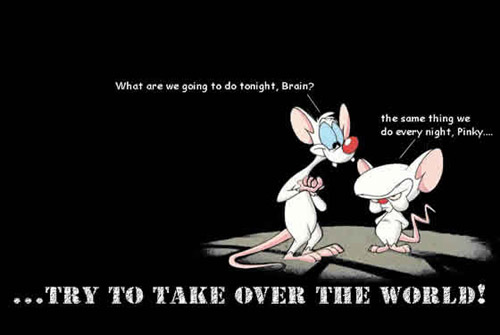I had the privilege of seeing retired four-star General Wesley Clark speak last week to an enthusiastic crowd of about 900. The program board scheduled his talk on the night of the NCAA basketball final: brilliant. I expected to see few students there, but I was pleasantly surprised when hundreds showed up—there obviously were more important events than getting drunk and watching Florida pound Ohio State.
Clark started with a brief history of the cold war with the former USSR,(pre many students' conception) and the ramifications of it ending, which nobody in the U.S. had anticipated. He claims we lost our way at that moment. We no longer could define ourselves by what we were and were not in contrast to the Soviets.
We had values.
We had capitalism.
We had no plan.
And when you don't have a plan, there are always forces willing to impose their own antiquated world view because of their inability to grow. Hence someone like Cheney, who didn't believe that the Soviets would crumble, and who was alarmed at the fall of the Berlin wall, had to shift his world axis and focus upon another "enemy." The "axis of evil" even has a familiar ring to it. Reagan called the former USSR something very similar, "The Evil Empire," in the early 1980s. It's Soviet speak, only tweaked a bit so it is now "Islamofascists" instead of "the Reds."
Clark stated that the only way we, as a country, would survive is if we negotiate--talk to people, "even bad people" as he put it. He said we cannot go "cowboy on the world" and expect to win hearts and minds. He also said that the military should always be the last option. The very last option.
Of course, he is disgusted with the mishandling of Iraq, but doesn't think we should abandon the Iraqis by unilaterally pulling out. He stated that we need to talk to Iran, to the Saudis, to the Jordanians and Syrians—all those that have something to gain and lose if Iraq continues as a failed state. He said in the last eight years, the "fine art of negotiations" had been abandoned for a "my way or the highway" stance that has only weakened us as even NATO is having second thoughts about the U.S. and its current foreign policy (or lack thereof). Clark would know of what he speaks since he was in command of NATO forces in Bosnia during the bombing of Serbia. Clark also is a veteran of Vietnam. He took four rounds of an AK47, and this changed his world view; he said it took nine years for him to look into a mirror and realize he was still deeply angry about being shot, that he hadn't killed the man that had shot him, that the war itself had been such a disaster.
One of the most interesting moments came during the Q & A that followed the speech. He was very generous with his time. But an awkward moment arose when Clark had to reiterate his belief that military action is an action of last resort during an exchange with a student who had escaped southern Sudan as a teenager, leading a pack of children out of the country during Khartoum's war with South Sudan. The student asked "Shoudn't the United States intevene militarily in Darfur?" And Clark answered "No. We have to negotiate with Khartoum and the rebels: they both have blood on their hands." He then spoke awhile about the disaster and genocide that was taking place in the Sudan, but stated that this was not something the U.S. military could solve. It must have been hard to say this to the Sudanese student, knowing full well what horrors this young man had seen, and that Africa is neglected (as he noted in his speech as well).
Overall, I was very impressed. If you can catch him speaking somewhere, do so. It's worth your time.



0 Comments:
Post a Comment
<< Home